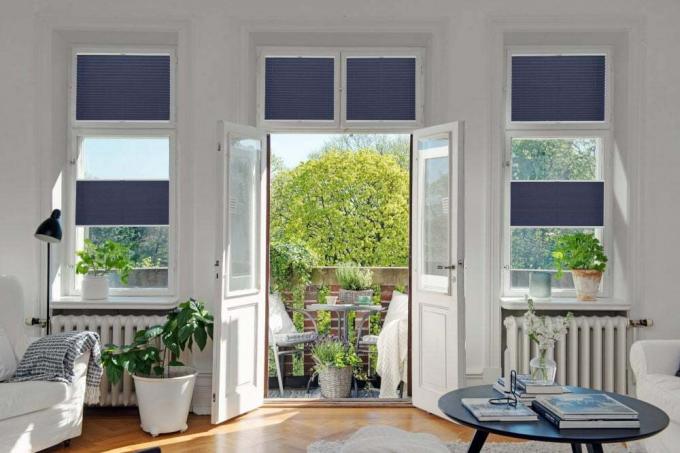

Table of contents
- Static defaults
- different material
- Maximum load limit
- Guide values per square meter
- load limit decreases
- Everyday use
- Exceptional use
- Regular controll
- Liability for payload
Balconies in the house can be used in different ways. The load capacity of the building sets natural limits. In the following article you will find out what load is possible.
Static defaults
Regardless of the material or type of construction, all balconies must be able to withstand between 400-500 kilograms per square meter. This is in the DIN EN 1991-1-1:2010-12 in connection with DIN EN 1991-1-1/NA: 2010-12 (has replaced DIN 1055-3).
different material
The material is important for the concrete load-bearing capacity of a balcony. Reinforced concrete or metal are considered the materials that best withstand loads. Wood, on the other hand, is less suitable. Finally, this is more weather-prone.
A notice:
If you opt for a wooden structure, regular replacement of the material is necessary.
Maximum load limit
Every balcony has a limited carrying capacity. Construction and material determine the maximum load limit. Basically, you should always keep an eye on the maximum load to prevent damage. In the worst case, the structure can collapse if you ignore the load limit.

Guide values per square meter
The static specifications differ depending on the year the building was built. The guidelines are in the relevant DIN EN 1991-1-1:2010-12 in connection with DIN EN 1991-1-1/NA: 2010-12 (has replaced DIN 1055-3). Balconies must withstand at least the following weight:
- Buildings built before 2010: 500 kilograms per square meter
- Building with year of construction from 2010: 400 kilograms per square meter
Tip:
In the past, balconies were often used to store heavy loads (e.g. wood and coal for heating), but this task is now almost completely eliminated.
load limit decreases
Compliance with the guide values is required for the construction of the balcony. However, this does not yet mean that the construction will be able to withstand all future requirements without hesitation. Over the years, the maximum possible load decreases. Weather influences affect the material and ensure a decreasing load capacity.
A notice:
If you have concerns about the current load-bearing capacity of the balcony, you should consult a structural engineer.
Everyday use
With everyday use, you can step onto the balcony without hesitation. After all, balcony furniture, flower pots and a reasonable number of people rarely reach the permitted load. This type of everyday use is not a problem for the balcony construction. This only looks different if homeowners make unusual use of their balconies.
A notice:
Up to four people per square meter do not reach the load limit. This already shows that in most cases the maximum load capacity is not reached.
Exceptional use
However, under certain circumstances, using the balcony can cause problems. This is the case, for example, with heavy constructions:
- paddling pool
- sandbox
- raised bed
- jacuzzi
A notice:
The weight of water is often underestimated. A water height of just 40 centimeters means a weight of 400 kilograms per square meter. Together with the weight of the paddling pool or whirlpool user, the maximum load capacity has been exceeded.
Regular controll
Regular checks are recommended in order to detect damage to the balcony at an early stage. Naturally, major damage is noticed more quickly. At the same time, you should also keep an eye on small cracks and damage. The first signs of a hazard differ depending on the material:
- reinforced concrete: small cracks
- Metal: rust
- Wood: rot or pest infestation
Tip:
With good care you can prevent the first damage. For example, you can use a sealant for the wood or a red protection agent for metal structures.
Liability for payload
In principle, the owner of a property is liable for the load capacity of the balconies. However, the tenant has an obligation to cooperate, as he sees the balcony more often. If the tenant notices any changes, he must inform the owner. In addition, the architects and structural engineers can also be liable. Although there is no explicit legal regulation, tenants should pay attention to the rental agreement. In some cases, the landlords contractually regulate which use of the balcony is permitted in order to avoid static hazards.
A notice:
If a balcony falls, legal advice is required. Finally, the owner, structural engineer, architect, builder or supplier may be liable.
 Home editorial office
Home editorial office
Learn more about window / balcony

Balcony power plant 800, 1000, 1200 watts: what is allowed?
In times of energy crisis and energy transition, solar panels on the balcony offer an easy way to generate and use sustainable electricity. We explain what is behind the so-called balcony power plants and how many watts are allowed during operation.

Insect protection for skylights with and without drilling
An insect screen for the roof window ensures that you can enjoy the summer and autumn time without annoying visitors such as mosquitoes, wasps and moths. Depending on your living situation, an insect screen with or without drilling is available for you.

Pleated too long: you can shorten it like this
When looking for a suitable pleated blind, the desired length is not always available. There are hardly any suitable models to be found, especially for windows or glass doors without standard dimensions. The simple solution: a pleated blind with individual dimensions. But what to do if a pleated blind already exists? We will explain to you in detail how you can […]

How to: Fix holes in plastic window
Repairing holes in a plastic window can be necessary for a number of reasons. However, the correct procedure is required for an almost invisible result of the repair. The appropriate instructions can be found here.

Attach pleated blinds: the type of window is decisive for the type of installation
There are various assemblies for screwing, clamping and gluing for the attachment of pleated blinds. When deciding on the appropriate form of attachment, however, it is advisable to take a look at the respective window model in order to avoid unpleasant surprises.

Measure pleated correctly | Determine height and width
Pleated blinds are a popular alternative to curtains and curtains. In order for a pleated blind to darken a window properly, it must fit well into the window. We show how to determine the height and width of different windows for different pleated blinds.
